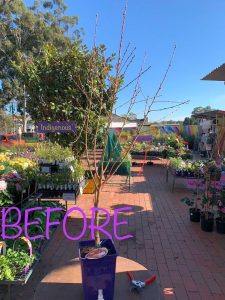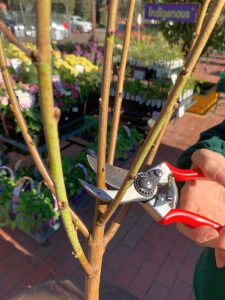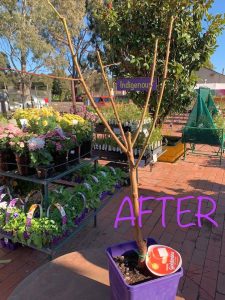Thanks to the people who have contributed to this week’s newsletter: Hanh Truong, Megan Cassidy, Sally Warner, Sally Watson, Simone Boyd, Stuart Rodda, Tereza Ash and Therese Scales.
If you are Gmail user and didn’t successfully receive our newsletter last week, read this short guide on how to stop Google’s blocking of our future newsletters.
Formative pruning of bare-root fruit trees (by Therese Scales)
[Therese is a horticulturalist at Nillumbik Nursery in Diamond Creek. Thanks to both Therese and Sally Watson (the owner of Nillumbik Nursery) for this article. Nillumbik Nursery write a monthly newsletter with gardening tips which you can sign up for here.]
Why prune fruit trees? Shouldn’t we just let them grow to their natural form?
As simple as that sounds, it is not the way you get the best results from a fruit tree.
These rules generally apply to stone fruit, apples and pears:
- A strong framework of balanced branches needs to be developed to hold a good crop of fruit in years to come.
- Fewer branches hold larger fruit.
- A smaller tree makes it easy to pick fruit and to net the tree, as well as produce less excess fruit at risk of Queensland Fruit Fly.
- Opening the inside of the tree into a vase shape reduces the risk of pests and diseases developing.
- It allows sunshine in so fruit can ripen.
- Make sure your secateurs are clean and sharp. A clean cut will heal better than a tear. Remember to also clean your snips when you move between trees to prevent the spread of disease.
- Choose four higher outward growing branches (not crossing) to form the framework by which the fruit will produce fruiting spurs.
- Choose branches which are not directly opposite one another at the same point around the trunk to avoid splitting.
- Prune just above an outward facing bud to encourage outward growth. The cut needs to be angled away from the bud to protect it and allow water to run off. Be careful not to cut too close to the bud (to avoid damage) yet not too far from it (which may result in die back of the stem).
- The first prune should have about 60 percent of the growth removed. In subsequent years, you will not need to prune as severely. The formative pruning takes about four years. As well as removing branches which are crossing, diseased, dying or dead, the idea is to develop about eight branches around the trunk. So you want a lateral branch growing from each of the 4 branches you started with. In this time, remove any fruit before it gets too heavy for the small branches.
Do I really have to drop all fruit for 4 years?
In an ideal world … yes. It will encourage strong healthy branches and payoff in the long run.
If you just can’t wait… If you absolutely need to see some fruit from your labour… If you smile and nod when you’re told it all needs to go (only to get home and secretly enjoy your first fruit)… Significant fruit thinning is the bare minimum to allow for ongoing success.
Can you prune to contain the size?
Yes, but it isn’t a matter of doing it once and then you’re done. Rather, it will need to be done at least annually.
Food forests (by Megan Cassidy)
[Megan, from Greensborough, is active within Sustainable Greensborough, one of whose activities is a monthly book club where they read, watch and chat about issues of sustainability on our planet. Their meetings are on the 4th Tuesday of every month, 7.30-8.30pm, with their next meeting being on 28th June.]
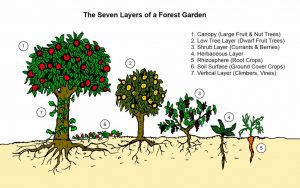 A food forest is a way to pack a lot of diversity into a small space, mimicking the layers of a true forest, so that it all works together to create a functioning and largely self-supporting ecosystem.
A food forest is a way to pack a lot of diversity into a small space, mimicking the layers of a true forest, so that it all works together to create a functioning and largely self-supporting ecosystem.
As illustrated in the diagram right (from Permaculture a beginner’s guide by Graham Burnett), there are 7 layers that are generally expected in a food forest, namely:
- Canopy layer.
- Understory layer.
- Shrub layer.
- Herbaceous layer.
- Rhizosphere layer.
- Groundcover layer.
- Vertical layer.
Each of these layers take up a different part of the ‘space’ available, which maximises the potential yields you can harvest. This is what Bill Mollison referred to as stacking in space.
Stacking in time
When designing your food forest, you need to think about including some fruit trees that are ready to harvest in autumn/winter, so that you have a crop after the main season of spring/summer has passed. Bill Mollison called this stacking in time – when you use varieties of food plants that will fruit/produce early or later than others, to extend your growing season.
More on unusual pumpkins
Simone Boyd, from the online veggie seed shop, Heirloom Naturally, has produced two more videos about her unusual pumpkins:
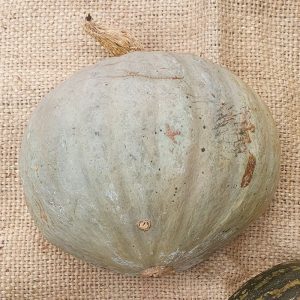 |
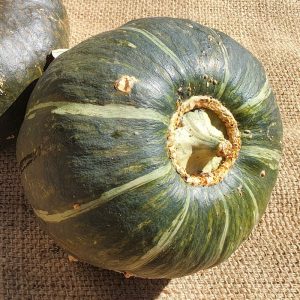 |
| Anna Swartz and Blue Ballet | Buttercup |
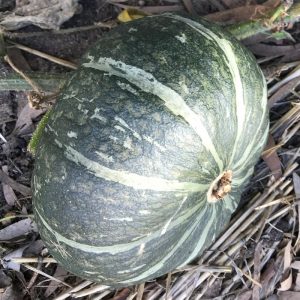 Sally Warner has also written in: “I began growing Ebisu pumpkins on the recommendation of the erstwhile owner of New Gippsland Seeds, Sue. It is a small-medium pumpkin which has a lovely rich pumpkin taste. I eat the skin, thus it is easy to prepare. I think it is the best tasting pumpkin. It doesn’t, however, keep as well as butternut or other pumpkins.“
Sally Warner has also written in: “I began growing Ebisu pumpkins on the recommendation of the erstwhile owner of New Gippsland Seeds, Sue. It is a small-medium pumpkin which has a lovely rich pumpkin taste. I eat the skin, thus it is easy to prepare. I think it is the best tasting pumpkin. It doesn’t, however, keep as well as butternut or other pumpkins.“
Do you know?
Tereza Ash wants to grow tree collards. She has been told that they should be grown from cutting rather than seed. But she doesn’t know anyone who she can get a cutting from, not do any of her local nurseries sell them. Do you have a tree collard that she could potentially have a cutting from, or know someone who does, or know of a nursery who sells them? If so, email me.
I had never heard of tree collards before Tereza wrote to me so I have now done a little research of my own. They are a perennial brassica, producing blue-green or purple leaves which taste similar to kale. They grow up to 3 metres in height but can be kept much smaller. They are in the same Acephala group of Brassica oleracea as kale. Daleys sometimes sell them online but are currently out of stock. Read more on the Project Tree Collard website.
The key point is, of course, that tree collards are perennial (as opposed to biennial or annual). Other edible, perennial brassicas are apparently kosmic kale and jersey cabbage.
A newsletter reader’s veggie growing tip
From Sally Warner: “Like me, do you ever collect your old shoe laces and then wonder what to do with them? Problem solved, they are perfect for tying up climbing vegetables, such as peas or beans, to their frame. They can be re-used many times, plus they are easy to use and undo.“
It would be good to include more reader tips in future newsletters. Email me with your best tips.
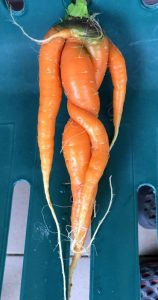 Every newsletter deserves a good picture
Every newsletter deserves a good picture
This picture of a carrot has been submitted by Stuart Rodda.
Another new article from Angelo Eliades
Three useful herbs which can be used as natural compost activators and much more. Spoiler alert: the three herbs are comfrey, nettles and yarrow.
Read more of Angelo’s food growing articles.
Not food related but interesting
Pablo Naranjo, who is one of the most popular guitarists at Eltham Farmers Market, has released a new album entitled Ecos del Frio. Listen to the album here. He will be launching it at The Bergy Seltzer in Sydney Road, Brunswick, on Sunday, 12th June, starting at 8pm. He is playing at the Thornbury Local on Saturday, 6th August 6, starting at 8pm.
Which link was clicked most times in the last newsletter?
The most popular link in the last newsletter was Moreland Council’s vegetable and fruit storage charts (high resolution pdf).
Regular activities over the coming week
Farmers’ markets
- Saturday: Abbotsford and Coburg.
- Sunday: Alphington, Carlton, Eltham and Whitehorse.
North East Region Permaculture will be having a stall at Eltham Farmers’ Market this coming Sunday (12th June). The theme is garden planning using the path of the sun and they will have an interactive model to help explain how to calculate the path of the sun through the year, plus they will hand out sun path diagrams for Melbourne.
Food swaps
- Saturday: Brunswick East, Hurstbridge and Mooroolbark.
- Sunday: zip.
Community gardens
- Thursday: Diamond Valley Library (Greensborough), Edible Hub (Hurstbridge), SEEDs (Brunswick) and Whittlesea.
- Friday: Reynard Street (Coburg) and West Brunswick.
- Saturday: Links (Lalor), Macleod, Northcote Community, Tables (Heathmont) and Thrive (Diamond Creek).
- Sunday: Fawkner Food Bowls, Pentridge (Coburg), Regent (Reservoir) and West Brunswick.
- Monday: SEEDs (Brunswick) and Whittlesea.
- Tuesday: Greensborough and Watsonia Library.
- Next Wednesday: Living & Learning Eltham, Macleod, Newton Street (Reservoir), Sylvester Hive (Preston) and Span (Thornbury).
Upcoming face-to-face events – introduction
You can view various calendars on our website by type of event: All once-off events, Cooking, Everything else and Free.
You can also view various calendars on our website by Council area: Banyule, Boroondara, City of Yarra, Darebin, Manningham, Maroondah, Moreland, Nillumbik, Whitehorse, Whittlesea and Yarra Ranges.
Upcoming face-to-face events – not cooking
Grapes and global warming wine masterclass; Thursday, 9th June, 7-8pm; $32 ($32 per hour); Northcote.
Explore the taste profile of 8 Ricca Terra wines, matching them to their taste profiles on the game board, whilst learning about the alternative grape varieties which are flourishing in Australia’s current climate.
Growing mushrooms at home; Saturday, 16th July, 10am-12.30pm; $95 ($38 per hour); Alphington.
Presenter: Julia Laidlaw from Sporadical City Mushrooms. This hands-on, beginners workshop will cover basic oyster mushroom growing. It is a skill sharing ‘tips and tricks’ lesson from an experienced commercial mushroom grower who started growing very basically at home in a small space with no technical equipment in the inner city. You will take home your own mushroom growing kit that you have prepared during the workshop, the materials and instructions needed to prepare a kit at home (re-purposed plastic bucket & lid, oyster mushroom grain spawn, enough straw for a grow kit, bag for pasteurising straw, small bottle of isopropyl alcohol for sterilisation).
Movie themed cocktail making class; Friday, 22nd July, 7-8.30pm; $95 ($64 per hour); Brunswick.
James will demonstrate how to make two classic cocktails: The Martini from James Bond; and The Singapore Sling from Fear and Loathing in Las Vegas. Then it will be your turn to roll up your sleeves, as you will be shown how to make: The Cosmopolitan from Sex and the City; The French 75 from Casablanca; and The Manhattan from Some Like it Hot.
The fungus amongst us; Saturday, 23rd July, 10am-12.30pm; $55 ($22 per hour); Alphington.
Explore the Darebin park lands through a fungal lens. Participants will be guided to see and get close to the local world of fungi. The park adventure will be led by local ecologist Dr Sapphire McMullan-Fisher. Founder of Sporadical City Mushrooms, Julia Laidlaw, will then share the world of zero waste mushroom farming at her farm on the edge of the park land.
Beekeeping – how to get started; Sunday, 31st July, 9.30-10.45am; $20 (reimbursable at the nursery); Diamond Creek.
Mike Hall will tell you about how to get started with bee keeping, why keep bees, sourcing your bees, registering them, equipment, disease control and feeding. Organised by Nillumbik Nursery.
Introduction to growing microgreens; Sunday, 31st July, 10am-midday; $60 ($30 per hour); Preston.
What you will learn: how CERES produces certified organic microgreens; how to grow pea shoots, radish, and sunflower sprouts at home; and how to plan for a continuous supply of these (enough for all your salad needs. Presenter: Daniel O’Farrell. Organised by CERES.
Home brewing; Sunday, 31st July, 10am-3pm; $80 ($18 per hour); CERES.
What you will learn: make your own beer; all about full grain brewing; and the fermentation process. Presenter: Paul Rigby. The workshop will be a practical demonstration of full grain brewing covering ingredients (including malt, hops, yeast and water), equipment, brewing theory, and (most importantly) the brewing process (including mashing, lautering, boiling, sanitation, fermentation and packaging). Samples will be available for tasting.
Fruit tree pruning with Kaye Roberts-Palmer; Tuesday, 2nd August, 11am-12.30pm; free; Doncaster.
Learn about pruning, fertilising, pests to watch out for and how to get the most out of your backyard fruit trees. Organised by Doncaster Library.
In June
- Introduction to home brewing; Wednesday, 8th June, 7-9pm; $5; Hurstbridge.
- Grapes and global warming wine masterclass; Thursday, 9th June, 7-8pm; $32 ($32 per hour); Northcote.
- Winter wine and cheese night with Boat O’Craigo; Friday, 10th June, 6-8pm; $75 ($38 per hour); Croydon.
- Wicking bed workshop; Saturday, 11th June, 11.30am-1pm; $15; Macleod.
- Men – top foods to keep your motor running; Tuesday, 14th June, 11am-midday; free; Warrandyte.
- Wine tasting and regenerative agriculture; Thursday, 16th June, 6.30-9pm; $50 ($20 per hour); Rosanna.
- Beginners guide to backyard chickens; Thursday, 16th June, 7-8.30pm; free; Mill Park.
- Growing mushrooms at home; Saturday, 18th June, 10am-12.30pm; $95 ($38 per hour); Alphington.
- Marvellous mulch – dive into the magic; Saturday, 18th June, 1-2.30pm; $59 ($39 per hour); Ringwood.
- Growing veggies in a wildlife garden; Saturday, 18th June, 1.30-3.30pm; free; Forest Hill.
- Setting up a worm farm; Saturday, 18th June, 2-3.30pm; free; Edendale.
- Meet the maker – Nerida, the PavQueen; Saturday, 18th June, 3-4pm; $19 ($19 per hour); Alphington.
- Meet the maker – Nerida, the PavQueen; Saturday, 18th June, 4.30-5.30pm; $19 ($19 per hour); Alphington.
- How to prune your fruit trees with Angelo Eliades; Sunday, 19th June, 10am-midday; $51 ($26 per hour); Preston.
- DIY hot compost with Kelly Gillespie; Sunday, 19th June, 1-3pm; $51 ($26 per hour); Preston.
- How to control the Queensland Fruit Fly, with Angelo Eliades; Tuesday, 23rd June, 7-8pm; free; Watsonia.
- Worm farming with Angelo Eliades; Saturday, 25th June, 10am-midday; $51 ($26 per hour); Preston.
- Growing berries; Saturday, 25th June, 10am-3pm; $115 ($23 per hour); CERES.
In July
- Winter fruit tree maintenance; Saturday, 2nd July, 9.30am-midday; $55 ($22 per hour); Bulleen Art & Garden.
- Food photography; Saturday, 2nd July, 2-5pm; $109 ($36 per hour); Eltham.
- Berries and vines with Angelo Eliades; Sunday, 3rd July, 10am-midday; $51 ($26 per hour); Preston.
- Pruning and care of fruit trees; Saturday, 9th July, 10am-3pm; $115 ($23 per hour); CERES.
- Urban food gardening (8 sessions); 8 consecutive Wednesdays from 13th July, 10am-2.30pm; $60 for all 8 sessions (Government subsidised fee); Eltham.
- Growing micro greens at home with Sustainable Gardening Australia; Thursday, 14th July, 6.30-7.30pm; free; Box Hill.
- Winter fruit tree pruning workshop; Saturday, 16th July, 9am-1pm; $75 ($19 per hour); Edendale.
- Much ado about compost; Saturday, 16th July, 10-11.30am; $59 ($40 per hour); Ringwood.
- Growing mushrooms at home; Saturday, 16th July, 10am-12.30pm; $95 ($38 per hour); Alphington.
- Organic propagation of vegetables and herbs; Saturday, 16th July, 10am-3pm; $115 ($23 per hour); CERES.
- Complete urban farmer (14 sessions); weekly, starting Thursday, 21st July, 9am-3pm; $880 ($10 per hour); CERES.
- Movie themed cocktail making class; Friday, 22nd July, 7-8.30pm; $95 ($64 per hour); Brunswick.
- Beeswax wraps; Saturday, 23rd July, 10am-midday; $75 ($38 per hour); CERES.
- The fungus amongst us; Saturday, 23rd July, 10am-12.30pm; $55 ($22 per hour); Alphington.
- Beekeeping – how to get started; Sunday, 31st July, 9.30-10.45am; $20 (reimbursable at the nursery); Diamond Creek.
- Introduction to growing microgreens; Sunday, 31st July, 10am-midday; $60 ($30 per hour); Preston.
- Home brewing; Sunday, 31st July, 10am-3pm; $80 ($18 per hour); CERES.
In August
- Fruit tree pruning with Kaye Roberts-Palmer; Tuesday, 2nd August, 11am-12.30pm; free; Doncaster.
Regular events
- Bakery Hill whisky distillery tour and tasting; various Sundays, various times; $64 ($43 per hour); Bayswater North.
- Beekeeping workshop; roughly once a month; $85 ($34 per hour); Brunswick East.
- Carlton aperitvio food tour; various Fridays, 5-7pm; $89 ($45 per hour); Carlton.
- Cocktail workshop; Saturdays, at 2pm and again at 6pm; $55 ($37 per hour); Northcote.
- Flavours of Coburg food tour; various Saturdays, 10am-1pm; $49 ($16 per hour); Coburg.
- Ratio Cocoa Roasters behind the scenes chocolate factory tour; various Fridays and Saturdays; $15 ($10 per hour); Brunswick.
Upcoming face-to-face events – cooking
A Palestinian banquet by chef Aheda; Thursday, 9th June, 6-8pm; $63 ($16 per hour); Coburg.
Aheda will serve classic Palestinian dishes using recipes handed down from her grandmother and her grandmother before that, going back over 1,000 years. Throughout the night, Aheda will speak about the significance of her food, culture and resistance. All funds will go to Aheda’s goal of launching a Palestinian food truck.
Rice paper rolls workshop; Friday, 17th June, at 4.30-5.30pm and then again at 6-7pm; $20 ($20 per hour); Eltham
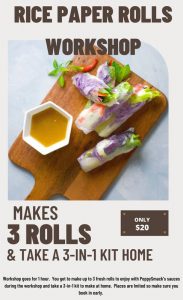 Designed for beginners, PoppySmack will show you how to make perfect rice paper rolls. At the end of the session, you will get to enjoy your finished products with a selection of PoppySmack’s sauces.
Designed for beginners, PoppySmack will show you how to make perfect rice paper rolls. At the end of the session, you will get to enjoy your finished products with a selection of PoppySmack’s sauces.
Sourdough bread workshop; Saturday, 25th June, 9-11.30am; $185 ($74 per hour); Brunswick East.
Nadine will demonstrate the technique of sourdough bread making and baking. Take a container to take home your dough to bake at home. This class is best suited to those who have some experience with bread making, however it is not essential. Organised by Park Orchards Community House.
An artisan chocolate baking class; Sunday, 10th July, 10am-1pm; $154 ($51 per hour); Alphington.
Nidhi, from Cocoa & Chili, will show you how to make ganache, hand rolled truffles, chocolate brownies and caramel sauce.
Beginners cheese making class; Sunday, 17th July, 10am-3pm; $200 ($40 per hour); Thomastown.
What you will learn: how to make hand-stretched fresh mozzarella and create bocconcini; how to make primo sale; and how to make fresh ricotta. What you will get: Italian style lunch; and primo sale and freshly made mozzarella to take home. Organised by That’s Amore Cheese.
Cup cake bouquet workshop; Friday, 29th July, 6.30-8.30pm; $70 ($35 per hour); Park Orchards.
Decorate cupcakes using buttercream icing and then arrange into a bouquet. Topics to be covered will include: how to make Italian buttercream frosting; different butter cream frosting; how to add different colour frosting in a piping bag; how to pipe six different types of flowers; how to pipe leaves; how to do two tone colour effects; and how to make a bouquet to hold the six cupcakes. Organised by Park Orchards Community House.
In June
- A Palestinian banquet by chef Aheda; Thursday, 9th June, 6-8pm; $63 ($16 per hour); Coburg.
- Sourdough basics; Thursday, 9th June, 6.30-8pm; $100 ($66 per hour); Collingwood.
- How to create almost vegetarian recipes; Saturday, 11th June, 10am-12.30pm; Forest Hill.
- Waste minimisation cooking; Saturday, 11th June, 11am-1pm; $16 ($8 per hour); Abbotsford.
- Rice paper rolls workshop; Friday, 17th June, 4.30-5.30pm; $20 ($20 per hour); Eltham.
- One pot wonders of the World – Malaysian curry laksa from scratch; Friday, 17th June, 5-10pm; $85 ($17 per hour); Panton Hill.
- Rice paper rolls workshop; Friday, 17th June, 6-7pm; $20 ($20 per hour); Eltham.
- Sourdough bread making; Saturday, 18th June, 9am-midday; $61 ($20 per hour); Panton Hill.
- Bush foods; Saturday, 18th June, 11am-1pm; $11; Abbotsford.
- Triple cream brie cheese; Sunday, 19th June, 10am-4pm; $170 ($28 per hour); CERES.
- Truffle workshop at Ratio Cocoa Roasters; Sunday, 19th June, 11am-12.30pm; $75 ($50 per hour); Brunswick.
- Truffle and praline workshop; Wednesday, 22nd June, 6-10pm; $180 ($45 per hour); Blackburn
- Sourdough bread workshop; Saturday, 25th June, 9-11.30am; $185 ($74 per hour); Brunswick East.
- Sourdough bread; Saturday, 25th June, 10am-12.30pm; $65 ($26 per hour); Park Orchards.
- Gluten-free kitchen skills; Sunday, 26th June, 10am-3pm; $115 ($23 per hour); CERES.
- Waste-free lunchbox ideas; Sunday, 26th June, 2-3pm; free; Reservoir.
- Pickling and fermentation workshop; Thursday, 30th June, 6.30-8.30pm; free; Watsonia.
In July
- Mozzarella making class; Saturday, 2nd July, 10am-midday; $120 ($60 per hour); Thomastown.
- Authentic Mexican; Saturday, 2nd July, 10am-3pm; $115 ($23 per hour); CERES.
- Tortelloni and ravioli class; Saturday, 9th July, 10am-1.30pm; $125 ($36 per hour); Thomastown.
- Chocolate discovery class; Saturday, 9th July, 11am-midday; $48 ($48 per hour); Yarra Glen.
- A Devonshire tea workshop (thermomix); Saturday, 9th July, 2-4pm; $15 ($8 per hour); Eltham.
- An artisan chocolate baking class; Sunday, 10th July, 10am-1pm; $154 ($51 per hour); Alphington.
- Middle Eastern cooking; Thursday, 14th July, 10.30am-1.30pm; $80 ($27 per hour); Park Orchards.
- Food for mind and gut; Saturday, 16th July, 10am-3pm; $115 ($23 per hour); CERES.
- Artisan bread making; Sunday, 17th July, 8am-2pm; $220 ($37 per hour); Abbotsford.
- Beginners cheese making class; Sunday, 17th July, 10am-3pm; $200 ($40 per hour); Thomastown.
- Truffle workshop at Ratio Cocoa Roasters; Sunday, 17th July, 11am-12.30pm; $75 ($50 per hour); Brunswick.
- Truffle and praline workshop; Wednesday, 20th July, 6-10pm; $180 ($45 per hour); Blackburn
- Sourdough bread baking; Saturday, 23rd July, 9am-5pm; $180 ($23 per hour); CERES.
- Feta and haloumi cheese making; Sunday, 24th July, 10am-4pm; $170 ($28 per hour); CERES.
- Cup cake bouquet workshop; Friday, 29th July, 6.30-8.30pm; $70 ($35 per hour); Park Orchards.
Regular classes
- @drool.aus (Italian); various Saturdays and Sundays; roughly $100 ($40 per hour); Fitzroy and Northcote.
- Al dente cooking (Italian); most Saturdays, 9am-1pm; $155 ($39 per hour); Chirnside Park.
- Become a junior chocolatier; various days and times; $40 ($53 per hour); Yarra Glen.
- Beginners bread making; various Sundays, 8am-2pm; $220 ($37 per hour); Abbotsford.
- Chocolate making workshop; various Thursdays, Fridays and Saturdays; $152 ($38 per hour); Blackburn.
- La Cucina di Sandra (Italian); various evenings, 6.30-10.30pm; $105 ($26 per hour); Richmond.
- Nonna & Mum’s cooking class; monthly on the 4th Thursday, 6-10pm; $20 ($7 per hour); Thornbury.
- Otao Kitchen (various classes); various dates, times and prices; Richmond.
- Rosa’s traditional Italian cooking class; various Fridays and Sundays; $155 ($39 per hour); Bundoora.
- The ultimate biscuit class; various Tuesdays, 10am-3pm; $162 ($32 per hour); Blackburn.

